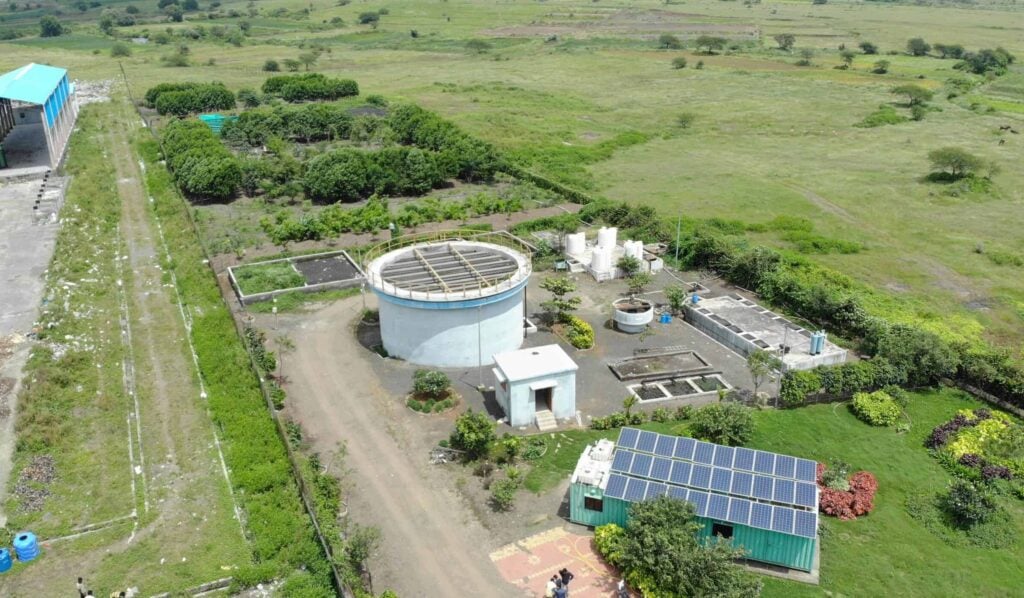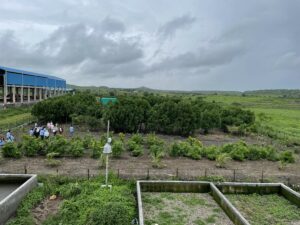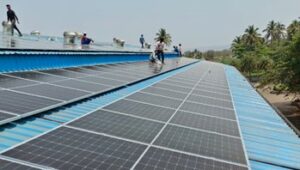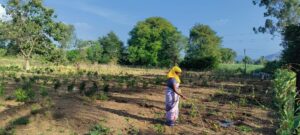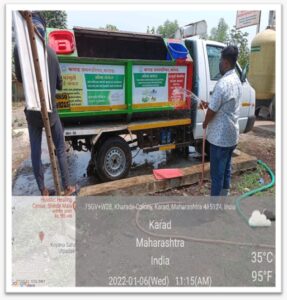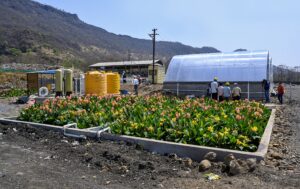Center for Water and Sanitation, CRDF, CEPT University, Ahmedabad
The Center for Water and Sanitation has been supporting small and medium cities in Maharashtra, namely Wai, Sinnar, Satara, and Karad, in improving their sanitation services through climate adaptive and mitigative actions.
The level of sanitation provision differs greatly in these cities, from fully sewered cities like Karad, to those entirely dependent on on-site sanitation, like Wai, Sinnar, and Satara. Looking ahead, these cities are implementing citywide inclusive sanitation services, including the scheduled desludging of septic tanks. All four cities have facilities to treat their septage and sewage, with faecal sludge treatment plants (FSTPs) in Wai, Sinnar, and Satara, and a sewage treatment plant (STP) in Karad.
Initial assessments found that treated wastewater was reused only in Sinnar, while the other treatment plants had no plans in place to reuse the treated byproducts. All four plants were using fossil-based energy sources with high carbon emissions and consequent adverse impacts on health and climate. Therefore, to practise a circular economy and become carbon neutral in sanitation, these cities are taking ambitious steps and spending a large amount of funds on the regular operation and maintenance of these services. CWAS supports them by preparing climate-sensitive resource recovery plans.
This initiative for a citywide sanitation service benefits the city population. The operational FSTPs and STP produce treated wastewater and treated dried sludge. The waste collected and treated is reused to create carbon sinks, while treated wastewater is reused to develop urban forests and greenscapes using drip irrigation methods in the vicinity of the FSTPs. In Karad, as the quantity of treated wastewater is greater, it is also reused for street cleaning, vehicle washing and more. Treated sludge is reused as compost, for soil enrichment in the urban forests, as well as being given to farmers for their use. The dried sludge is used mostly for non-food crops.
Over 10,000 trees of over 20 species covering an area of 28,463 sq m have been planted in these cities. The Councils of Wai, Sinnar and Karad have engaged self-help groups to maintain the urban forests and greenscape at the FSTPs on contract and they are paid monthly. The Satara Council has engaged waste collectors’ groups to maintain the FSTP as well as the urban forest. The forests so developed act as carbon sinks and have helped capture CO2 emissions.
Urban forests adjacent to the FSTP site in Sinnar
The treatment plants in Wai, Sinnar, Satara and Karad have also installed solar panels. The solar FSTPs in Wai, Satara and Sinnar have reached a net energy positive stage, and are helping mitigate tons of carbon emissions.
The use of treated wastewater to maintain the urban forest and greenscape at these three FSTPs has saved over 64 million litres of fresh water. Karad reuses 9.9 million litres of treated wastewater per day, saving the same amount of fresh water every day.
Barren land of around 28,463 sq m across these cities has now been converted to green area with forest cover. This will contribute to reducing the greenhouse effect and enrich biodiversity. At full potential these forest and landscaped areas have the ability to absorb over 1,600 tonnes of CO2 each year[1].
Some 140 Kw of alternative energy is also now being used across the four cities, which has led to the reduction of 173 tonnes of CO2 emissions annually[2]. These activities will help reduce carbon emissions and have reduced the recurring expenses of city governments while improving the environment.
Further, engaging self-help groups to maintain the gardens and urban forests has given their members a sustainable livelihood opportunity. Their formal engagement with city councils brings them a regular income, financial independence, and the capacity to meet their household expenses.
These earnings supported them during the pandemic in particular. The work has also boosted their confidence in public speaking and managing finances.
Solar panels installed at the Karad STP site to generate clean energy
Wai and Sinnar became the first cities in India to provide this service and safely treat collected sludge at a dedicated solar powered FSTP. CWAS has supported the four councils in implementing resource recovery plans for sanitation, to move these cities towards carbon neutrality in their sanitation services.
Multiple stakeholders were involved in planning and implementing the project, such as council officials, self-help groups, farmers, private consultants, operators and more. The Miyawaki technique [3] and professional landscaping consultants were involved in developing the urban forests. The plants used were selected keeping in mind the strata of the sites, local species as well as the climatic conditions of the cities.
Maintenance of Urban Forest by women Self Help Group (SHG)
A detailed assessment was performed for installing solar panels at the treatment plants. Their electricity bills were studied across the water, sanitation and hygiene (WASH) value chain, and their energy consumption was also studied carefully, to assess the number and capacity of solar panels required. Potential spaces for placing the panels were identified in consultation with council officials.
Treated wastewater being reused to wash vehicles by the Karad Municipal Council
An online monitoring system has been set up at the Wai and Sinnar plants to monitor the quality of the treated byproducts. The Karad plant has an in-house laboratory which analyses the quality of treated water daily. The cities also send samples of treated water and sludge to private laboratories for verification.
Net metres / behind the metre systems[4] have been installed to monitor the generation of units through solar panels. Tools developed by the Ministry of New and Renewable Energy and the Government of India are used to quantify the CO2 sequestering.
Satara FSTP site
Wai, Sinnar, Satara and Karad are representative of the over 7,400 towns in India, including 3,600 urban local governments and 3,800 census towns. Many small cities in South Asia and Africa are of similar size to these four cities. Thus, reuse approaches and climate adaptive /mitigative approaches can be learned from these experiences.
For cities in Maharashtra in particular, with this demonstration at the city level, these approaches will be scaled up as a part of the Majhi Vasundhara Abhiyan or My Earth Mission of the Department of Environment and Climate Change, Government of Maharashtra. The mission focuses on climate change and environmental issues and supports all cities in Maharashtra. CWAS has a memorandum of understanding with the department to scale up climate friendly WASH initiatives under the mission.
Scaling to other cities will be accomplished through linkages with other state or national government programs like the Swachh Bharat and AMRUT missions. The tools and guidelines developed based on this experience will benefit city governments across India in planning and implementing WASH-Carbon neutral initiatives.
[1] Values derived from Sharma et al. (2021) and Crisil Foundation (2021). The formula considers tree species, tree height and girth and their CO2 equivalents.
[2] Calculation based on the National Portal for Solar Rooftop tool and the Ministry of New and Renewable Energy, Government of India.
[3] This technique mimics the conditions of a mature natural forest in decades instead of centuries. It involves identifying a combination of native plant species that complement the unique conditions at the planting site.
[4] BTM systems provide energy directly to your home without going through an electric metre or interacting with the electric grid.
















